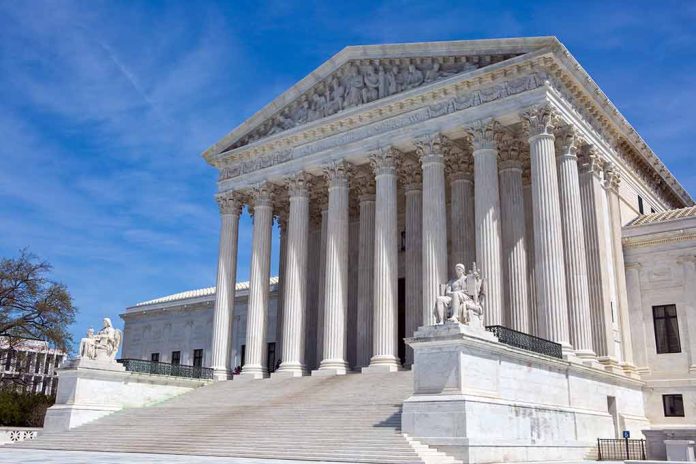
The Supreme Court is set to review a case that could redefine parental rights in school vaccination protocols, sparking a nationwide debate on informed consent.
At a Glance
- A Vermont family is appealing to the Supreme Court after their 6-year-old was vaccinated without consent
- Vermont Supreme Court ruled school and state staff protected under PREP Act
- Case highlights tension between public health measures and parental rights
- Decision could set precedent affecting children’s rights across America
Vermont Case Sparks National Debate
A controversial case from Vermont has made its way to the Supreme Court, challenging the boundaries of parental rights in school vaccination protocols. The case stems from an incident where a 6-year-old child was accidentally vaccinated at school without parental consent, leading to a legal battle that could have far-reaching implications for family rights and public health policies nationwide.
The Vermont Supreme Court dismissed the family’s lawsuit, ruling that Academy School and state staff were protected under the Federal Public Readiness and Emergency Preparedness Act (PREP Act). This decision has raised concerns about the extent of government immunity in matters of public health and parental consent.
The Incident and Its Aftermath
The vaccination occurred at a school clinic in November 2021, organized in collaboration with the Vermont Department of Health. Despite the child’s protest, a mix-up with another student’s name led to the unauthorized vaccination. School officials subsequently apologized to the family and took steps to improve screening procedures.
Superintendent Mark Speno emphasized the importance of respecting parents’ rights, stating, “The Health Department has worked to evaluate its procedures to ensure that this does not happen again. Thankfully, we are not aware of any harm to the student because of this mistake. We take our responsibilities to students and families very seriously, and we respect parents’ rights to make health care decisions for their children.”
Legal Implications and Broader Context
The case has brought to light the tension between public health measures and parental rights. The PREP Act, originally intended to provide immunity to certain “covered persons” during public health emergencies, is now being scrutinized for its potential to override constitutional liberties and parental rights.
The Vermont ruling did not consider constitutional liberties, parental rights, or informed consent, focusing instead on the immunity granted by the PREP Act. This approach has alarmed parents’ rights advocates, who argue that such interpretations could set a dangerous precedent for government overreach in medical decisions for children.
National Implications
The Supreme Court’s decision on this case could have significant ramifications for children’s rights across America. Similar cases in other states, including North Carolina, Wyoming, Nevada, Kansas, Kentucky, and Oklahoma, have also struggled with recognizing parental rights in medical decisions for children.
The case highlights a growing distrust in vaccines, pharmaceutical companies, schools, and courts, exacerbated by controversial Covid-19 policies. As the nation watches, the Supreme Court’s ruling will likely shape the future landscape of parental rights, public health policies, and the balance between individual liberties and collective safety measures in schools across the country.
Sources:
Vermont Supreme Court dismisses unauthorized Academy School vaccination case
Fact Check: Vermont Supreme Court did not rule that schools can force-vaccinate students













